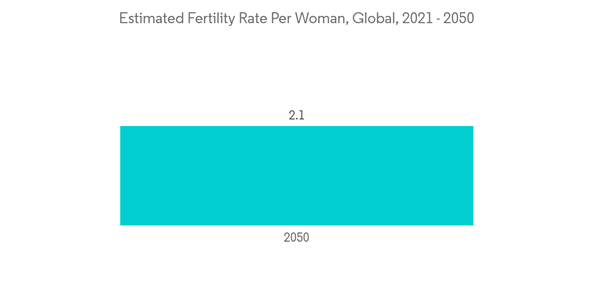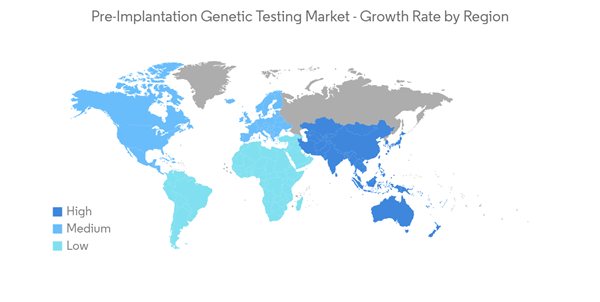During COVID-19, there was an increasing adoption of the preimplantation of genetic testing, which is expected to drive the market's growth. The NCBI article published in October 2021 mentioned preimplantation genetic testing and embryologist specialization provided safety and assisted reproduction process have not negatively impacted patients with a previous record of COVID-19 infection. However, according to another NCBI article published in September 2022, women with COVID-19 during Pregnancy might have a higher risk of obstetrical and neonatal complications. Such risk of pre-natal complications in the infected patients boosted the demand for preimplantation genetic testing during the pandemic. Thus, the COVID-19 pandemic has increased the market's growth, which is expected to follow the same traction during the forecast period of the study.
The primary factor attributing to the market's growth is a rising awareness among parents regarding advancements in diagnostics, with a massive volume of neonatal deaths due to complications during childbirth. The growing prevalence of congenital genetic diseases like Edwards syndrome and common pediatric respiratory disorders such as pneumonia and asthma has been observed in recent years. As per the NCBI article published in August 2021, the in-facility birth prevalence rate for congenital abnormalities in South Africa was 15.57 per 1,000 live births. Another NCBI published in September 2022 states that the live birth prevalence with Edwards syndrome in the UK ranges from 1 in 3600 to 1 in 10,000. These abnormalities occur almost exclusively in couples with hereditary disorders, which were observed to occur majorly in industrialized nations. Thus, increased demand for earlier diagnosis and government initiatives to control the healthcare burden will likely drive the preimplantation genetic testing market.
Additionally, the increasing product launches by various market players are expected to boost market growth over the forecast period. For instance, Eurofins Genoma launched the niPGT-A, a non-non-invasive, in September 2022. It is an embryo biopsy-free, preimplantation genetic aneuploidy screening test. It provides IVF centers with access to a highly accurate alternative to traditional PGT-A testing.
Thus, the factors such as the growing prevalence of congenital genetic diseases and increasing product launches are expected to contribute to the market's growth over the forecast period. However, the small size of the study population and ethical concerns, costly testing procedures, and unfavorable regulatory framework and challenges during the development stage may restrain the market's growth over the forecast period.
Preimplantation Genetic Testing Market Trends
IVF Prognosis is Expected to Hold a Significant Market Share in the Preimplantation Genetic Testing Market Over the Forecast Period
Invitro fertilization(IVF) is a method of assisted reproduction and treatment for specific genetic and fertility issues. The prognosis for IVF is a necessary procedure to inspect the medical condition of the embryos by preimplantation genetic testing methods. Thus, preimplantation genetic testing plays a crucial role in the IVF prognosis, thereby contributing to the growth of the studied segment. The IVF prognosis segment is expected to account for a significant share of the preimplantation genetic testing market. It is mainly due to the high number of invitro fertilization procedures owing to the increased demand for preimplantation genetic testing procedures.For instance, according to the MayoClinic article updated in May 2022, globally, 10-12% of couples have difficulty conceiving, which is expected to increase gradually in the coming years. IVF accounts for 1.6% and 4.5% of all US and Europe live births, respectively. Also, the same article quoted that approximately 25% to 35% of infertile women have a subperitoneal disease. Pelvic inflammatory disease (PID) is the most common cause of infertility, and poor semen quality in men is the sole cause of infertility in 20% of couples. Such a high burden of people having difficulty conceiving and a decrease in fertility rates contributes to the segment's growth.
Additionally, the rising product launches by various market players are expected to drive the growth of the studied segment over the forecast period. For instance, in July 2022, GenEmbryonics launched the commercial whole genome sequencing test for effectively screening all genetic diseases in IVF embryos. This comprehensive testing clarifies the embryo's genome sequence, allowing disease-causing mutations to be identified and screened.
Thus, factors such as rising infertility, increasing preference for IVF procedures, and growing product launches for IVF prognosis are expected to drive the growth of the studied segment over the forecast period.
North America is Expected to Hold a Significant Share in the Preimplantation Genetic Testing Market Over the Forecast Period
North America is expected to dominate the preimplantation genetic testing market. The dominance is due to a growing volume of cases of chromosome abnormality leading to various genetic disorders. Additionally, the increasing consumer awareness and the presence of significant market players in this region are also driving factors for the growth of the market in this region.According to the Centers for Disease Control and Prevention (CDC) report in April 2021, about 6,000 babies born in the US have down syndrome every year. Similarly, the Province of British Columbia, Canada, an article published in February 2021, mentioned that in Canada, one in every 750 live babies born has Down syndrome. Additionally, the data published in Facets Journal in November 2021 noted that rare diseases affect approximately 1 in 12 Canadians, and most have underlying genetic causes. It, in turn, resulted in high demand for earlier diagnoses to identify the genetic defects in embryos, thus driving the market in the region.
The increasing market player's activities, such as partnerships, mergers, and collaborations in North America to develop products, are also expected to contribute to the market's growth. For instance, in October 2022, Ovation Fertility partnered with Genomic Prediction to license the LifeView PGT platform for genetic testing. This Lifeview PGT provides the most comprehensive currently available genetic test of the preimplantation embryo.
Thus, the high burden of genetic diseases and increasing market players' activities, coupled with the rising awareness regarding preimplantation genetic testing in North American countries, is expected to drive the market's growth in this region over the forecast period.
Preimplantation Genetic Testing Market Competitor Analysis
The preimplantation genetic testing market is moderately competitive and consists of several major players. Few of the key players dominating the market are following various strategies like an increased focus on R&D and launching new products. Some of the major companies currently dominating the market are The Cooper Companies Inc., Illumina Inc., Thermo Fisher Scientific Inc., PerkinElmer Inc., and Bioarray SL.Additional benefits of purchasing the report:
- The market estimate (ME) sheet in Excel format
- 3 months of analyst support
This product will be delivered within 2 business days.
Table of Contents
Companies Mentioned (Partial List)
A selection of companies mentioned in this report includes, but is not limited to:
- The Cooper Companies Inc.
- Illumina Inc.
- Thermo Fisher Scientific Inc.
- Quest Diagnostics Inc.
- PerkinElmer Inc.
- Invitae Corp.
- Natera Inc.
- Igenomix Sl
- Bioarray SL
- Genea Ltd










